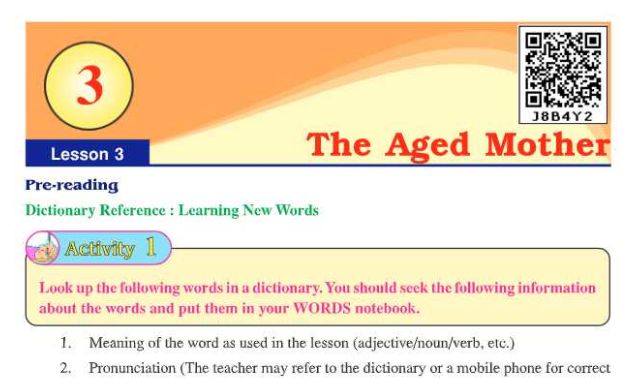Story - The Aged Mother
PSEB 8th Class English Book
Long, long ago there lived at the foot of the mountain a poor farmer and his aged, widowed mother. They owned a bit of land which supplied them with food, and they were humble, peaceful, and happy.
Shining was governed by a despotic leader who though a warrior, had a great and cowardly shrinking from anything suggestive of failing health and strength. This caused him to send out a cruel proclamation. The entire province was given strict orders to immediately put to death all aged people. Those were barbarous days, and the custom of abandoning old people to die was not uncommon. The poor farmer loved his aged mother with tender reverence, and the order filled his heart with sorrow. But no one ever thought twice about obeying the mandate of the governor, so with many deep and hopeless sighs, the youth prepared for what at that time was considered the kindest mode of death.

Just at sundown, when his day’s work was ended, he took a quantity of unwhitened rice which was the principal food for the poor, and he cooked, dried it, and tied it in a square cloth, which he swung in a bundle around his neck along with a gourd filled with cool, sweet water. Then he lifted his helpless old mother to his back and started on his painful journey up the mountain. The road was long and steep; the narrow road was crossed and re-crossed by many paths made by the hunters and woodcutters. In some place, they lost and confues, but he gave no heed. One path or another, it mattered not. On he went, climbing blindly upward — ever upward towards the high bare summit of what is known as Obatsuyama, the mountain of the “abandoning of the aged.”
The eyes of the old mother were not so dim but that they noted the reckless hastening from one path to another, and her loving heart grew anxious. Her son did not know the mountain’s many paths and his return might be one of danger, so she stretched forth her hand and snapping the twigs from brushes as they passed, she quietly dropped a handful every few steps of the way so that as they climbed, the narrow path behind them was dotted at frequent intervals with tiny piles of twigs. At last the summit was reached. Weary and heart sick, the youth gently released his burden and silently prepared a place of comfort as his last duty to the loved one. Gathering fallen pine needles, he made a soft cushion and tenderly lifted his old mother onto it. Hew rapped her padded coat more closely about the stooping shoulders and with tearful eyes and an aching heart he said farewell.
The trembling mother’s voice was full of unselfish love as she gave her last injunction. “Let not thine eyes be blinded, my son.” She said. “The mountain road is full of dangers. LOOK carefully and follow the path which holds the piles of twigs. They will guide you to the familiar path farther down.” The son’s surprised eyes looked back over the path, then at the poor old, shriveled hands all scratched and soiled by their work of love. His heart broke within and bowing to the ground, he cried aloud: “oh, Honorable mother, your kindness breaks my heart! I will not leave you. Together we will follow the path of twigs, and together we will die!”
Once more he shouldered his burden (how light it seemed now) and hastened down the path, through the shadows and the moonlight, to the little hut in the valley. Beneath the kitchen floor was a walled closet for food, which was covered and hidden from view. There the son hid his mother, supplying her with everything she needed, continually watching and fearing she would be discovered. Time passed, and he was beginning to feel safe when again the governor sent forth heralds bearing an unreasonable order, seemingly as a boast of his power. His demand was that his subjects should present him with a rope of ashes.
The entire province trembled with dread. The order must be obeyed yet who in all Shining could make a rope of ashes? One night, in great distress, the son whispered the news to his hidden mother. “Wait!” she said. “I will think. I will think” On the second day she told him what to do. “Make rope of twisted straw,” she said. “Then stretch it upon a row of flat stones and burn it on a windless night.” He called the people together and did as she said and when the blaze died down, there upon the stones, with every twist and fiber showing perfectly, lay a rope of ashes.
The governor was pleased at the wit of the youth and praised greatly, but he demanded to know where he had obtained his wisdom. “Alas! Alas!” cried the farmer, “the truth must be told!” and with deep bows he related his story. The governor listened and then meditated in silence. Finally he lifted his head. “Shining needs more than strength of youth,” he said gravely. “Ah, that I should have forgotten the well-known saying, “with the crown of snow, there cometh wisdom!” That very hour the cruel law was abolished, and custom drifted into as far a past that only legends remain.
 बहुत समय पहले एक गरीब किसान और उसकी बूढ़ी विधवा मां पहाड़ की तलहटी में रहते थे। उनके पास थोड़ी-सी जमीन थी, जो उन्हें खाने के लिए अनाज देती थी, और वे साधारण, शांतिपूर्ण, और खुशहाल थे।
बहुत समय पहले एक गरीब किसान और उसकी बूढ़ी विधवा मां पहाड़ की तलहटी में रहते थे। उनके पास थोड़ी-सी जमीन थी, जो उन्हें खाने के लिए अनाज देती थी, और वे साधारण, शांतिपूर्ण, और खुशहाल थे।
शिनिंग पर एक अत्याचारी शासक का शासन था, जो एक योद्धा होने के बावजूद, किसी भी चीज़ से डर जाता था जो खराब सेहत और ताकत की कमी का संकेत देती थी। इसी कारण उसने एक क्रूर घोषणा जारी की। पूरे राज्य को सख्त आदेश दिया गया कि सभी बुजुर्ग लोगों को तुरंत मार दिया जाए। ये बर्बर दिन थे, और बूढ़े लोगों को मरने के लिए छोड़ने की प्रथा आम बात थी। गरीब किसान अपनी बूढ़ी माँ से बहुत प्यार करता था और यह आदेश उसके दिल को दुख से भर गया। लेकिन कोई भी राज्यपाल के आदेश की अवहेलना करने की सोच भी नहीं सकता था, इसलिए गहरी और निराश आहों के साथ, युवक ने उस समय के सबसे दयालु माने जाने वाले तरीके से मृत्यु की तैयारी की।
सूर्यास्त के समय, जब उसका दिन का काम समाप्त हो गया, तो उसने बिना पॉलिश किया हुआ चावल लिया, जो गरीबों का मुख्य भोजन था, और उसे पकाया, सुखाया, और एक चौकोर कपड़े में बांधकर अपनी गर्दन के चारों ओर एक गठरी की तरह लटका लिया, साथ में ठंडे, मीठे पानी से भरा हुआ एक लौकी भी थी। फिर उसने अपनी असहाय बूढ़ी माँ को अपनी पीठ पर उठाया और पहाड़ की ओर अपनी दर्दनाक यात्रा शुरू की। रास्ता लंबा और खड़ी चढ़ाई वाला था; संकरा रास्ता कई शिकारियों और लकड़हारे द्वारा बनाए गए रास्तों से कई बार पार किया गया था। कुछ जगहों पर वे रास्ता भूल गए, लेकिन उसने इस पर ध्यान नहीं दिया। एक रास्ता हो या दूसरा, इससे कोई फर्क नहीं पड़ता था। वह अंधाधुंध ऊपर चढ़ता गया – हमेशा ऊपर की ओर, उस ऊँचे, खुले शिखर की ओर, जिसे ओबात्सुयामा के नाम से जाना जाता है, “बुजुर्गों को छोड़ने का पहाड़।”
बूढ़ी माँ की आंखें इतनी धुंधली नहीं थीं कि वे एक रास्ते से दूसरे रास्ते पर जाने की जल्दी न देख पातीं, और उनके प्यारे दिल में चिंता होने लगी। उसका बेटा पहाड़ के कई रास्तों को नहीं जानता था और उसकी वापसी खतरनाक हो सकती थी, इसलिए उसने झाड़ियों से टहनियाँ तोड़ीं और हर कुछ कदम पर एक मुट्ठी टहनियाँ गिरा दीं ताकि जैसे-जैसे वे चढ़ते गए, उनके पीछे का संकरा रास्ता टहनियों के छोटे-छोटे ढेरों से बिंधा हुआ हो। अंत में वे शिखर पर पहुँच गए। थके हुए और दिल टूटे हुए युवक ने अपनी माँ को धीरे से उतारा और चुपचाप एक आरामदायक जगह बनाई, जो उसके प्रियजन के प्रति उसका अंतिम कर्तव्य था। उसने गिरे हुए पाइन के पत्तों का एक नरम गद्दा बनाया और अपनी बूढ़ी माँ को उस पर धीरे से बैठाया। उसने उसके गद्देदार कोट को झुकते कंधों के चारों ओर कसकर लपेटा और आंसुओं से भरी आँखों और दुखी दिल से विदा ली।
कांपती हुई माँ की आवाज़ निस्वार्थ प्रेम से भरी हुई थी जब उसने अपनी आखिरी सलाह दी। “तेरी आँखें बंद न हों, मेरे बेटे,” उसने कहा। “पहाड़ का रास्ता खतरों से भरा है। ध्यान से देखो और उस रास्ते का अनुसरण करो जिस पर टहनियों के ढेर हैं। वे तुम्हें नीचे की ओर जाने वाले परिचित रास्ते तक ले जाएंगे।” बेटे की हैरान आंखों ने पीछे की ओर देखा, फिर उस गरीब बूढ़े, सिकुड़े हाथों की ओर देखा, जो अपने प्रेम के काम से खरोंच और गंदे हो गए थे। उसका दिल टूट गया और वह जमीन पर झुक कर चिल्लाया: “ओह, सम्मानित माँ, आपकी दयालुता मेरा दिल तोड़ देती है! मैं आपको नहीं छोड़ूंगा। हम दोनों मिलकर टहनियों के रास्ते का अनुसरण करेंगे, और हम दोनों मिलकर मरेंगे!”
एक बार फिर उसने अपनी माँ को अपनी पीठ पर उठाया (अब कितना हल्का लग रहा था) और पगडंडी से नीचे की ओर दौड़ा, छायाओं और चाँदनी के बीच से होते हुए घाटी में स्थित अपनी छोटी-सी झोपड़ी तक पहुँचा। रसोई के फर्श के नीचे एक दीवारों वाला अलमारी थी, जो भोजन के लिए थी और दिखाई नहीं देती थी। वहीं बेटे ने अपनी माँ को छिपा दिया, उसे हर चीज़ की जरूरत की चीजें दीं और लगातार यह देखते रहे कि कहीं उसे पता न चल जाए। समय बीतता गया, और वह सुरक्षित महसूस करने लगा था कि एक बार फिर राज्यपाल ने अपने दूतों को एक अनुचित आदेश के साथ भेजा, जो उसके शक्ति के दावे के रूप में प्रतीत होता था। उसकी मांग थी कि उसके प्रजा उसे राख की रस्सी बनाकर पेश करें।
पूरे प्रांत में भय व्याप्त हो गया। आदेश का पालन करना ही था, लेकिन शिनिंग में कौन राख की रस्सी बना सकता था? एक रात, बड़ी चिंता में, बेटे ने अपनी छिपी हुई माँ को यह खबर फुसफुसाई। “रुको!” उसने कहा। “मैं सोचूंगी। मैं सोचूंगी।” दूसरे दिन उसने उसे क्या करना है बताया। “फूस की रस्सी बनाओ,” उसने कहा। “फिर इसे सपाट पत्थरों की पंक्ति पर फैलाओ और बिना हवा वाली रात में इसे जलाओ।” उसने लोगों को बुलाया और वही किया जैसा उसकी माँ ने कहा, और जब आग बुझ गई, तो पत्थरों पर, हर मोड़ और तंतु को पूरी तरह दिखाते हुए, राख की एक रस्सी पड़ी थी।
राज्यपाल युवक की बुद्धिमानी से खुश हुआ और उसकी बहुत प्रशंसा की, लेकिन उसने यह जानना चाहा कि उसने अपनी बुद्धि कहाँ से प्राप्त की। “हाय! हाय!” किसान रो पड़ा, “सच्चाई बतानी होगी!” और गहरी झुक कर उसने अपनी कहानी सुनाई। राज्यपाल ने सुना और फिर चुपचाप ध्यान किया। अंत में उसने अपना सिर उठाया। “शिनिंग को केवल युवाओं की ताकत से ज्यादा की जरूरत है,” उसने गंभीरता से कहा। “आह, मुझे प्रसिद्ध कहावत कैसे भूल गई, ‘बर्फ के मुकुट के साथ, बुद्धि आती है!’ उसी घंटे क्रूर कानून को समाप्त कर दिया गया, और प्रथा अतीत में इतनी दूर चली गई कि केवल किंवदंतियाँ ही बची हैं।”
Activity 1
PSEB 8th Class English Book
Look up the following words in a dictionary. You should seek the following information about the words and put them in your WORDS notebook.
1. Meaning of the word as used in the lesson (adjective/noun/verb. etc.)
2. Pronunciation (The teacher may refer to the dictionary or a mobile phone for correct pronunciation.)
3. Spellings.
- Despotic
- English: Exercising power in a cruel or oppressive way; tyrannical.
- Hindi: तानाशाही; जो क्रूरता या अत्याचार से शासन करता है।
Suggestive
- English: Tending to suggest an idea; indicative or hinting at something.
- Hindi: सुझाव देने वाला; किसी चीज़ का संकेत देने वाला।
Failing
- English: Becoming weaker or less effective; losing strength or power.
- Hindi: कमजोर होना; प्रभाव या ताकत खोना।
Prompted
- English: Caused or encouraged someone to take action; urged.
- Hindi: प्रेरित किया; किसी को कार्य करने के लिए प्रोत्साहित किया।
Barbarous
- English: Extremely cruel or harsh; lacking culture or refinement; primitive.
- Hindi: बर्बर; बहुत क्रूर या कठोर; असंस्कृत।
Abandoning
- English: Leaving something or someone completely and usually forever; giving up.
- Hindi: त्यागना; पूरी तरह से छोड़ देना, अक्सर हमेशा के लिए।
Widowed
- English: Having lost a spouse through death and not remarried.
- Hindi: विधवा/विधुर; जिसके पति या पत्नी की मृत्यु हो गई हो और पुनर्विवाह न किया हो।
Humble
- English: Having or showing a modest or low estimate of one’s importance; not proud.
- Hindi: विनम्र; अपनी अहमियत का कम या साधारण अनुमान रखने वाला।
Reckless
- English: Careless of consequences; lacking caution; rash.
- Hindi: लापरवाह; परिणामों की परवाह न करने वाला; जल्दबाजी में।
Snapped
- English: Broke suddenly and completely, typically with a sharp cracking sound.
- Hindi: चटखना; अचानक और पूरी तरह से टूट जाना, आमतौर पर तेज़ आवाज के साथ।
Hastened
- English: Hurried or moved quickly; rushed.
- Hindi: जल्दी करना; तेज़ी से बढ़ना।
Blaze
- English: A bright flame or fire; a strong burst of light or color.
- Hindi: ज्वाला; तेज़ आग या रोशनी का जोरदार चमकना।
Abolished
- English: Formally put an end to (a system, practice, or institution).
- Hindi: समाप्त करना; किसी प्रणाली, प्रथा या संस्था को औपचारिक रूप से समाप्त करना।
Frailty
- English: Weakness or vulnerability; delicate and fragile condition.
- Hindi: कमजोरी; नाजुक या कमजोर स्थिति।
Activity 2
Put a tick on the option that brings out the meaning of the underlined word.
It was governed by a despotic leader.
(a) A person who expects everyone to obey all his orders. ✔️He had a great dislike for anything suggestive of failing health and strength.
(a) giving an idea of ✔️This prompted him to make a cruel law for the province.
(a) encouraged to do something ✔️Those were barbarous days.
(a) uncivilized ✔️The custom of abandoning old people to die was not uncommon.
(a) to leave or desert ✔️The narrow road was crossed and re-crossed by many paths made by the hunters and the woodcutters.
(a) small width ✔️She stretched forth her hand and snapped the twigs from bushes.
(a) broke ✔️His demand was that his subjects should present him with a rope of ash.
(a) people ✔️That very hour the cruel law was abolished.
(a) came to an end ✔️He realized that old age meant experience of life and not frailty.
(a) physical weakness ✔️
Activity 3
PSEB 8th Class English Book
Rearrange the sentences given below in the correct sequence.
Write the numbers in the given brackets. The first one is done for you.
1. The son decided to take his mother back home.
2. A farmer decided to leave his old mother on the top of a mountain.
3. The governor realized his mistake and abolished the law.
4. Once in Shining, a cruel ruler made a law that all the old people must be put to death.
5. Using the idea of his old and experienced mother, the farmer made a rope of ash.
6. When the farmer turned to go back home, the mother advised him to return home with the help of twigs.
7. Filled with fear, he hid his mother in his home.
8. The mother dropped the small twigs as markers on the way to help her son return home safely.
Correct sequence of the sentences based on the story:
- Once in Shining, a cruel ruler made a law that all the old people must be put to death.
- A farmer decided to leave his old mother on the top of a mountain.
- The mother dropped the small twigs as markers on the way to help her son return home safely.
- When the farmer turned to go back home, the mother advised him to return home with the help of twigs.
- The son decided to take his mother back home.
- Filled with fear, he hid his mother in his home.
- Using the idea of his old and experienced mother, the farmer made a rope of ash.
- The governor realized his mistake and abolished the law.
Activity 4
Answer the following questions in one or two sentences.
What was the cruel announcement made by the despotic leader?
Answer: The order was to kill all the old people in the province.हिंदी में: आदेश यह था कि प्रांत के सभी बुजुर्ग लोगों को मार दिया जाए।
ਪੰਜਾਬੀ ਵਿੱਚ: ਹੁਕਮ ਸੀ ਕਿ ਸੂਬੇ ਦੇ ਸਾਰੇ ਬੁੱਢੇ ਲੋਕਾਂ ਨੂੰ ਮਾਰ ਦਿੱਤਾ ਜਾਵੇ।Why was the farmer sorrowful?
Answer: The farmer was sad because he loved his old mother and did not want to leave her.हिंदी में: किसान दुखी था क्योंकि वह अपनी बूढ़ी माँ से प्यार करता था और उसे छोड़ना नहीं चाहता था।
ਪੰਜਾਬੀ ਵਿੱਚ: ਕਿਸਾਨ ਦੁੱਖੀ ਸੀ ਕਿਉਂਕਿ ਉਹ ਆਪਣੀ ਬੁੱਢੀ ਮਾਂ ਨੂੰ ਪਿਆਰ ਕਰਦਾ ਸੀ ਅਤੇ ਉਸ ਨੂੰ ਛੱਡਣਾ ਨਹੀਂ ਚਾਹੁੰਦਾ ਸੀ।What things did the farmer carry to the top of the mountain?
Answer: The farmer took some cooked rice and a pot of cold water to the top of the mountain.हिंदी में: किसान पके हुए चावल और ठंडे पानी का एक बर्तन पर्वत की चोटी पर ले गया।
ਪੰਜਾਬੀ ਵਿੱਚ: ਕਿਸਾਨ ਪੱਕੇ ਹੋਏ ਚਾਵਲ ਅਤੇ ਠੰਢੇ ਪਾਣੀ ਦਾ ਇੱਕ ਘੜਾ ਪਹਾੜ ਦੀ ਚੋਟੀ ਤੇ ਲੈ ਗਿਆ।What made the mother anxious as they climbed up the mountain?
Answer: The mother was worried because her son did not know all the paths on the mountain and could get lost on his way back.हिंदी में: माँ चिंतित थी क्योंकि उसके बेटे को पहाड़ के सभी रास्ते नहीं पता थे और वह वापसी के रास्ते में खो सकता था।
ਪੰਜਾਬੀ ਵਿੱਚ: ਮਾਂ ਚਿੰਤਿਤ ਸੀ ਕਿਉਂਕਿ ਉਸ ਦੇ ਪੁੱਤ ਨੂੰ ਪਹਾੜ ਦੇ ਸਾਰੇ ਰਸਤੇ ਨਹੀਂ ਪਤਾ ਸਨ ਅਤੇ ਉਹ ਵਾਪਸੀ ਤੇ ਖੋ ਜਾ ਸਕਦਾ ਸੀ।What did the mother drop along the way?
Answer: The mother dropped small twigs along the way.हिंदी में: माँ ने रास्ते में छोटी टहनियाँ गिरा दीं।
ਪੰਜਾਬੀ ਵਿੱਚ: ਮਾਂ ਨੇ ਰਸਤੇ ਵਿੱਚ ਛੋਟੀਆਂ ਟਾਹਣੀਆਂ ਸੁੱਟ ਦਿੱਤੀਆਂ।What was the advice given by the farmer’s mother for the safe return of her son?
Answer: She told her son to follow the path with the piles of twigs to return safely.हिंदी में: उसने अपने बेटे को सलाह दी कि वह टहनियों के ढेर वाले रास्ते पर चलकर सुरक्षित वापस आए।
ਪੰਜਾਬੀ ਵਿੱਚ: ਉਸ ਨੇ ਆਪਣੇ ਪੁੱਤ ਨੂੰ ਸਲਾਹ ਦਿੱਤੀ ਕਿ ਉਹ ਟਾਹਣੀਆਂ ਦੇ ਢੇਰ ਵਾਲੇ ਰਸਤੇ ਉੱਤੇ ਚੱਲ ਕੇ ਸੁਰੱਖਿਅਤ ਵਾਪਸ ਆਵੇ।Where did the farmer hide his mother?
Answer: The farmer hid his mother in a walled closet under the kitchen floor.हिंदी में: किसान ने अपनी माँ को रसोई के फर्श के नीचे बनी एक दीवारों वाली अलमारी में छिपा दिया।
ਪੰਜਾਬੀ ਵਿੱਚ: ਕਿਸਾਨ ਨੇ ਆਪਣੀ ਮਾਂ ਨੂੰ ਰਸੋਈ ਦੇ ਫਰਸ਼ ਦੇ ਹੇਠਾਂ ਬਣੀ ਇੱਕ ਕੰਧ ਵਾਲੀ ਅਲਮਾਰੀ ਵਿੱਚ ਛਿਪਾ ਦਿੱਤਾ।When did the Governor realize his mistake?
Answer: The Governor realized his mistake when he understood that real wisdom comes with age.हिंदी में: गवर्नर को अपनी गलती का अहसास तब हुआ जब उसे समझ आया कि असली बुद्धि उम्र के साथ आती है।
ਪੰਜਾਬੀ ਵਿੱਚ: ਗਵਰਨਰ ਨੂੰ ਆਪਣੀ ਗਲਤੀ ਦਾ ਅਹਸਾਸ ਤਦ ਹੋਇਆ ਜਦ ਉਸ ਨੂੰ ਸਮਝ ਆਇਆ ਕਿ ਅਸਲੀ ਅਕਲ ਉਮਰ ਨਾਲ ਆਉਂਦੀ ਹੈ।
Activity 5
Identify the underlined character(s).
Identify the underlined character(s).
1. He gave orders for the aged to be put to death.
2. He considered the order to be the kindest mode of death.
3. She quietly dropped some twigs on the way.
4. Together we will follow the path, together we will die.
5. He listened and meditated in silence.
Solutions:-
1. The governor of Shining
2. the farmer
3. the farmer’s old mother
4. the farmer and his old mother
5. The governor.
Activity 6
Fill in the blanks with suitable determiners.
1. I went to …………….. window which commanded a large green garden.
2. I have …………………. work to do…
3. Lookout of the window for ………………… minute.
4. …………… shirt is costly but ……………….. shirt is cheap.
5. ………………….. books she had were all lost.
6. ………………… pen costs two rupees.
7. But I had …………………. idea of all this.
8. He didn’t make . …………….. mistakes in the essay.
9. I borrowed ……………….. books from him.
10. It educates both ……………….. blind and the helpers.
11. We should look into ………………….. depth of the problem.
12. It was ………………….. daring idea.
13. ………………….. boys attended the class.
14. This is …………….. good home for him.
15. ………………… teachers were asked to be present on Sunday.
16. …………………. sum cannot be solved by ……….. silly boys.
17. Besides them stood Pasteur, holding a narrow tube in … ………… hand.
18. They took samples from ………………. brain of a dog that had died.
19. ………….. little knowledge is …………….. dangerous thing.
20. He takes ……………… interest in me.
- I went to the window which commanded a large green garden.
- I have much work to do.
- Look out of the window for a minute.
- This shirt is costly but that shirt is cheap.
- The books she had were all lost.
- This pen costs two rupees.
- But I had no idea of all this.
- He didn’t make any mistakes in the essay.
- I borrowed some books from him.
- It educates both the blind and the helpers.
- We should look into the depth of the problem.
- It was a daring idea.
- Few boys attended the class.
- This is a good home for him.
- All teachers were asked to be present on Sunday.
- This sum cannot be solved by any silly boys.
- Besides them stood Pasteur, holding a narrow tube in his hand.
- They took samples from the brain of a dog that had died.
- A little knowledge is a dangerous thing.
- He takes no interest in me.
Activity 7
Rewrite the following sentences after correcting them by adding/deleting a word wherever necessary in each sentence :
Only few men are honest.
Answer: Only a few men are honest.The man is mortal.
Answer: Man is mortal.He acted like man.
Answer: He acted like a man.Beas flows in Punjab.
Answer: The Beas flows in the Punjab.You are in wrong but he is in right.
Answer: You are in the wrong but he is in the right.He is by far ablest boy.
Answer: He is by far the ablest boy.Nobody likes a person with bad temper.
Answer: Nobody likes a person with a bad temper.The iron is useful metal.
Answer: Iron is a useful metal.Not word was said.
Answer: Not a word was said.He has too high a opinion of you.
Answer: He has too high an opinion of you.Learn this poem by the heart.
Answer: Learn this poem by heart.Never tell lie.
Answer: Never tell a lie.
Activity 8
PSEB 8th Class English Book
Listen to your teacher carefully. She/he will tell you a story. Write the story in the given space as you hear it. Listen carefully to the pauses and tone and use appropriate punctuation marks.
The Lion and the Boar
It was a hot summer day. A lion and a boar reached a small water body for a drink. They began arguing and fighting about who would drink first. After a while they were tired and stopped for breath, when they noticed vultures above. Some. they realized that the vultures are waiting for one or both of them to fall, to feast on them. The lion and the boar then decided that it were best to make up and be friends than fight and become food for vultures. They drank the water together and went their own ways.
Activity 9
Create a dialogue between yourself and the Fire station informing them about the fire near your house. Once you have written the dialogue in your notebooks, practise it with your partner. You must take turn to play both roles.
You: Hello, is this the Fire Station?
Fire Station: Yes, this is the Fire Station. How can we help you?
You: There is a fire near my house at [Your Address]. It seems to be spreading quickly, and we need help immediately!
Fire Station: Thank you for the information. We are dispatching a fire truck to your location right away. Please stay safe and keep a safe distance from the fire.
You: Thank you! We’ll wait for the fire truck. Please hurry!
Activity 10
Write a short story. You may use some of the following words and phrases :
- felt scared
- heard the sound in the cupboard
- thought it must be a thief
- might be a killer
- lay still
- could hardly breathe
- felt someone touched my foot
- shouted with fear
- parents came and switched on light
- saw a rat
A Night of Fear
One dark night, I was lying in bed when I suddenly heard a sound coming from the cupboard. My heart started pounding, and I felt scared. I thought it must be a thief, or even worse, it might be a killer! I lay still, holding my breath, afraid to move or make a sound. I could hardly breathe as I listened carefully. The sound grew louder, and I felt someone or something touch my foot. I shouted with fear, my voice trembling.
Within seconds, my parents rushed into the room and switched on the light. They looked around, searching for the source of my terror. My father slowly opened the cupboard, and there it was—a small rat scurrying away! We all burst into laughter, realizing how silly it was to be so scared. That night, I learned that sometimes, our fears are much bigger than reality.
Activity 11
Suppose your classroom has been attacked by a swarm of bees. It is time to go back home. Get into groups of five and think of how you will take your bags from the classroom full of bees. You will get 5 minutes to discuss.
Plan to Retrieve Bags from a Classroom Full of Bees
Divide Responsibilities:
Form small teams within your group of five. Each team will have a specific role:- Team 1: Two people to distract the bees.
- Team 2: Two people to retrieve the bags.
- Team 3: One person as a lookout for safety and to give signals.
Create a Distraction:
The distraction team will find a way to lure the bees away from the classroom door. They can use objects like a piece of paper or a stick to wave near the entrance to make noise or lightly tap. The idea is to slowly lure the bees outside or towards a window.Cover Up for Safety:
Before entering, everyone should cover themselves as much as possible with clothing like jackets, scarves, or anything to cover exposed skin. This is to avoid bee stings.Retrieve the Bags:
When most of the bees are distracted, the retrieval team will quickly enter the classroom, grab as many bags as possible, and bring them back out. They should be quick and quiet to avoid provoking the bees further.Communication is Key:
The lookout will keep watch for any sudden movement of the bees and give hand signals to the retrieval team to move in or back out if needed.Exit Quickly and Safely:
Once the bags are retrieved, everyone should leave the area immediately and regroup in a safe spot.Seek Help:
If the bees are too aggressive or things get out of control, the group should immediately seek help from teachers or other authorities to manage the situation safely.
This plan should help your group discuss how to handle the situation effectively in 5 minutes. Stay calm and work together!
Author
-
Vivek Kaushal is a passionate educator with over 14 years of teaching experience. He holds an MCA and B.Ed. and is certified as a Google Educator Level 1 and Level 2. Currently serving as the Principal at Vivek Public Sr. Sec. School, Vivek is dedicated to fostering a dynamic and innovative learning environment for students. Apart from his commitment to education, he enjoys playing chess, painting, and cricket, bringing a creative and strategic approach to both his professional and personal life.
View all posts



